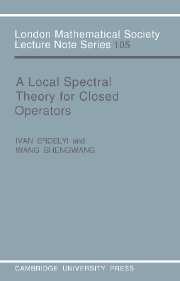Book contents
- Frontmatter
- Contents
- PREFACE
- Glossary of Notations and Symbols
- Chapter I INTRODUCTION
- Chapter II THE SPECTRAL DECOMPOSITION PROPERTY
- Chapter III SPECTRAL DUALITY
- Chapter IV SPECTRAL RESOLVENTS
- Chapter V SPECIAL TOPICS IN SPECTRAL DECOMPOSITION
- Appendix A The (**)-version of the predual theorem
- Appendix B Some open problems
- BIBLIOGRAPHY
- Index
Appendix B - Some open problems
Published online by Cambridge University Press: 05 April 2013
- Frontmatter
- Contents
- PREFACE
- Glossary of Notations and Symbols
- Chapter I INTRODUCTION
- Chapter II THE SPECTRAL DECOMPOSITION PROPERTY
- Chapter III SPECTRAL DUALITY
- Chapter IV SPECTRAL RESOLVENTS
- Chapter V SPECIAL TOPICS IN SPECTRAL DECOMPOSITION
- Appendix A The (**)-version of the predual theorem
- Appendix B Some open problems
- BIBLIOGRAPHY
- Index
Summary
In the Notes and Comments on Chapter IV (p.106), a diagram of implications between various types of spectral resolvents is given. Are there more implications? Specifically:
PROBLEM 1. Is every spectral resolvent of a given operator monotonic? Is every spectral resolvent analytically invariant?
PROBLEM 2. Is every monotonic spectral resolvent strongly monotonic? Is every monotonic spectral resolvent analytically invariant? Is every almost localized spectral resolvent a strong spectral resolvent? Is every almost localized spectral resolvent analytically invariant?
In [W.a] it was shown that there exists a complex Banach space X and an operator T ∈ B(X), which is decomposable, the adjoint T* is strongly decomposable but T is not strongly decomposable. This gives rise to
PROBLEM 3. Does it exist a complex Banach space X and a strongly decomposable T ∈ B(X), with T* decomposable but not strongly decomposable?
PROBLEM 4. Is it true that T is strongly decomposable iff T** is strongly decomposable?
In the study of operators with the SDI, Corollary 17.10 asserts that if a closed operator is endowed with the SDI then it has the SSDP. What about the converse?
Information
- Type
- Chapter
- Information
- Publisher: Cambridge University PressPrint publication year: 1985
